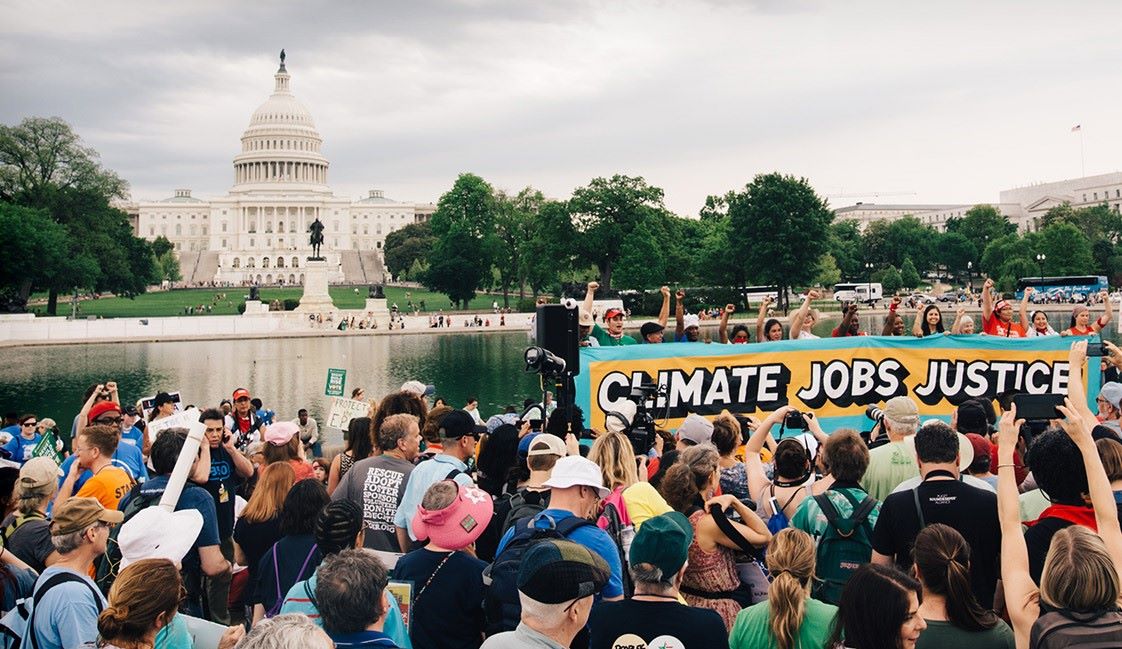
Good Climate News Roundup – March 2025
Mar 31, 2025

The first Earth Day on April 22, 1970, marked a turning point in U.S. environmentalism. Over the previous decade, several events had swelled a rising tide of eco-consciousness around the country. Biologist Rachel Carson’s book Silent Spring warning of the dire ecological and health impacts of pesticides alarmed the public – and Congress. A massive oil spill off the coast of Santa Barbara, California and an oil fire on Ohio’s heavily polluted Cuyahoga river garnered national attention and ignited support for environmental regulation.
An ardent conservationist serving in Congress, Senator Gaylord Nelson (WI-D), saw an opportunity to launch a movement. Inspired by the anti-war protests and teach-ins sweeping colleges across the country, he established a nonprofit named Environmental Teach-In and hired young activist Denis Hayes to coordinate the program. Hayes built a national staff and soon expanded outreach beyond college campuses to community groups, teachers’ associations, labor unions and other organizations. The nonprofit promoted April 22 as a national day of action, and on the first Earth Day 20 million people – then 10% of the country’s population – took to the streets to demonstrate for environmental protections against industrial pollution.
Senator Nelson was not the only conservationist on the Hill who saw the right moment to build a movement. Marion Edey, a 25-year-old congressional staffer, had a vision for a national political group for environmentalists. With the support of many environmental leaders of the time, Edey founded the League of Conservation Voters in 1970. In its early years, LCV launched tools such as the National Environmental Scorecard to track how members of Congress voted on key environmental issues, and the “Dirty Dozen” list of candidates with the worst environmental records.
1970 also saw the establishment of the Environmental Protection Agency and passage of the National Environmental Education Act, the Occupational Safety and Health Act, and the Clean Air Act. Other foundational environmental laws soon followed, including The Clean Water Act in 1972, the Endangered Species Act in 1973, and Superfund in 1980. The young U.S. environmental movement celebrated a series of hard-won victories.
Today on the 54th Earth Day, we seem poised on the brink of another turning point. Despite the UN signing of the Paris Climate Agreement to limit climate change on Earth Day 2016, the climate is fast approaching major tipping points as the world sees more disasters fueled by climate change. But as we highlight in our Good Climate News series, there is also a lot of progress to celebrate around the world — and especially here in the United States.
The U.S. is leading the way on climate progress with the Biden-Harris administration being the most pro-environment, pro-climate, and pro-conservation administration in our country’s history. The Biden-Harris administration has made protecting our communities and our environment a priority from day one. Working with environmental champions in Congress, they passed monumental climate investments. The Infrastructure Investments and Jobs Act established critical funding for the administration’s Investing in America agenda to revitalize the country’s infrastructure and increase climate resilience while creating good-paying jobs. The Inflation Reduction Act in 2022 introduced historic investments to tackle climate change, transition to clean energy, and protect the health of communities and the environment. More highlights of the climate investments and programs over the past three years include:
Committing to climate justice: In his executive order Tackling the Climate Crisis at Home and Abroad issued during his first week in office, President Biden established the Justice40 initiative. It directs 40% of federal investments in clean energy and transportation, energy efficiency, sustainable housing, workforce development, pollution reduction and more to historically excluded communities. A huge win for climate justice, the initiative ensures the communities that experience the worst impacts of climate change and pollution and receive the least resources – often majority Black, Latine or Indigenous communities and low-wealth communities – will no longer be left behind.
Creating jobs that are good for workers and the environment: President Biden announced the American Climate Corps program in 2023 to provide young people with paid training opportunities to launch good-paying careers in clean energy, conservation, and climate resilience. Today, he’s marking Earth Day by launching the website to apply for the program.
Setting conservation records: The Biden-Harris administration launched a $1 billion America the Beautiful Challenge in 2022 to accelerate land, water, and wildlife conservation efforts across the country. They are well on their way to achieving their goal to conserve at least 30% of U.S. lands and waters by 2030. In the first three years of his term, President Biden has already set conservation records, protecting more than 24 million acres of public land and investing over $18 billion in conservation programs.
And he’s not slowing down in 2024. So far this year, and even just in the past few weeks, we’ve seen a slate of huge wins for people and the planet, including:
All of these wins add up to momentous progress. But whenever there is progress, there is also pushback. Extreme MAGA Republicans in Congress are fighting to roll back the Biden-Harris administration’s historic wins for people and the planet. As just a few recent examples, they are attempting to:
This Earth Day, while we celebrate all of these wins and more, we’re keeping up the fight to prevent them from being rolled back while pushing forward on new victories. Celebrate Earth Day and join the fight – get involved today and take action to help protect your community and the planet.